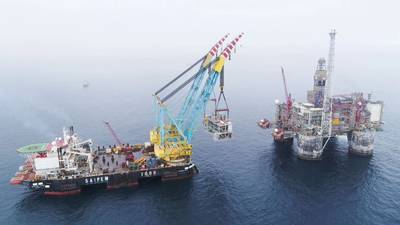Wintershall Dea Trims Norway Portfolio

Wintershall Dea is currently developing its operated Dvalin field on the Norwegian continental shelf (Photo: Wintershall Dea)
Wintershall Dea has agreed to sell its stakes in Norway's Nyhamna gas processing terminal and the Polarled gas pipeline to CapeOmega and Solveig Gas to focus on its upstream oil and gas activities, the German oil and gas company said on Tuesday.
Cape Omega will acquire a 5% interest in the Nyhamna terminal, while Solveig Gas will buy a 13.3% stake in Polarled, which delivers gas from Equinor's Aasta Hansteen field to Nyhamna, Wintershall Dea said in a statement.
The transaction is expected to close by the end of 2019, pending regulatory approvals.
Mario Mehren, CEO of Wintershall Dea, said, “The sale of these two assets is an important step in the direction of capturing value from active portfolio management. The transaction will allow us to streamline our business activities in Norway and focus our efforts on higher priority assets in our portfolio.”
Wintershall Dea holds interests in more than 100 licenses in Norway. In the year ended December 31, 2018, Norway accounted for 23.8 % (140 mboe / d) of the group's aggregated production (590 mboe / d).
Alv Solheim, Managing Director of Wintershall Dea in Norway, said, “Norway will continue to play an important role in Wintershall Dea’s international portfolio in the coming years and this transaction is in line with our strategy of focusing on our upstream activities and ambition to capture future growth opportunities on the Norwegian continental shelf.”
Next to operating three Norwegian producing fields, the company is also developing its own operated Dvalin and Nova fields, and is a partner in several high-profile projects, such as the Njord re-development, Ærfugl and the Snorre Expansion Project.









